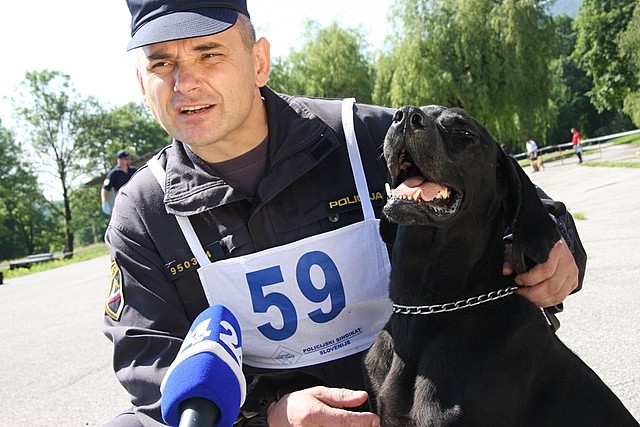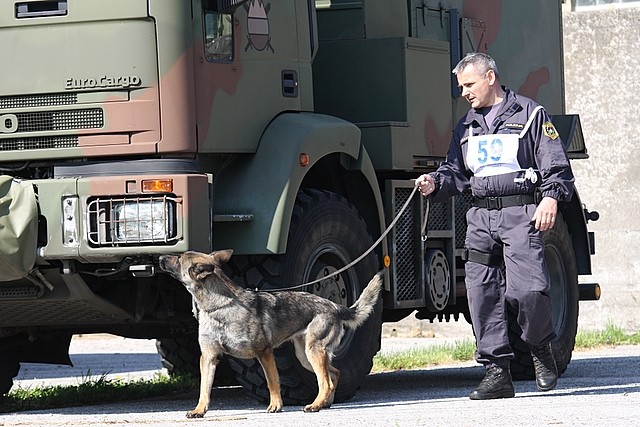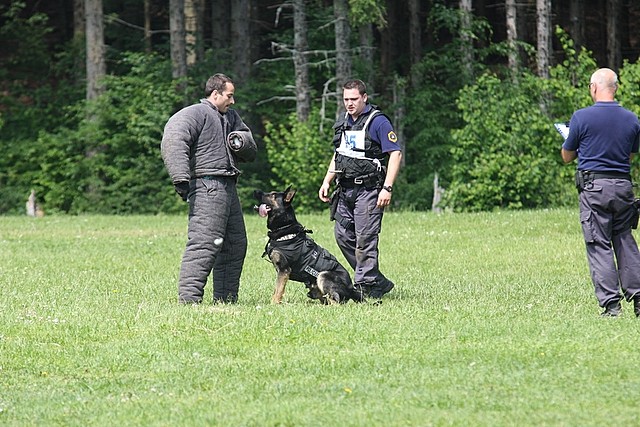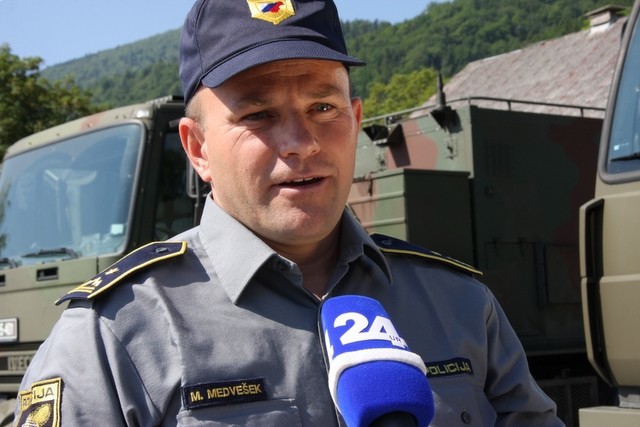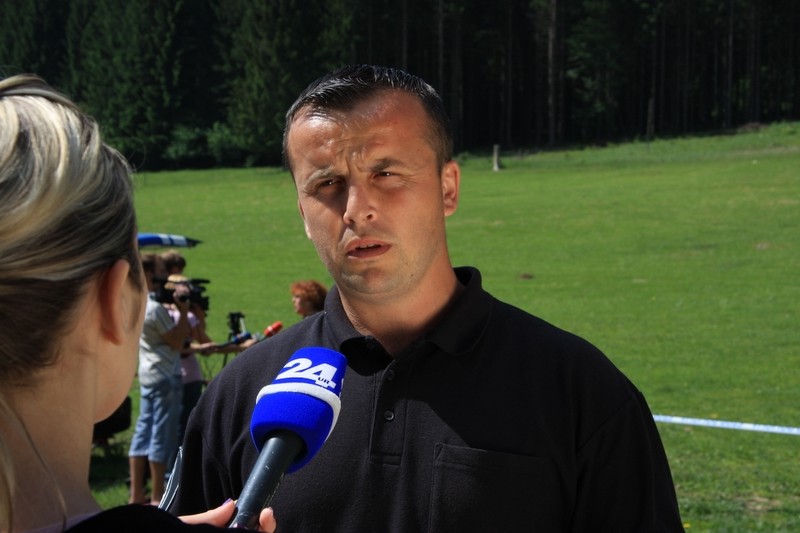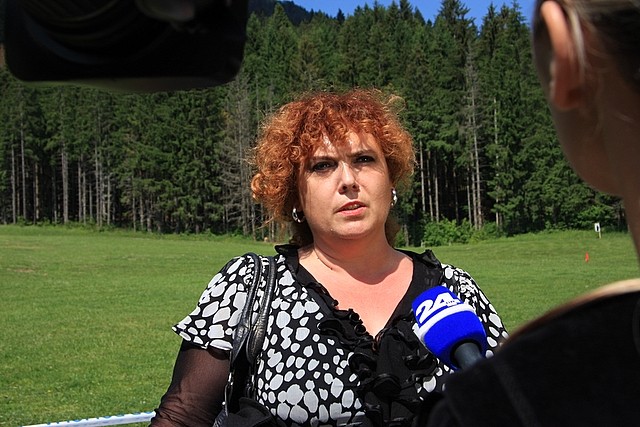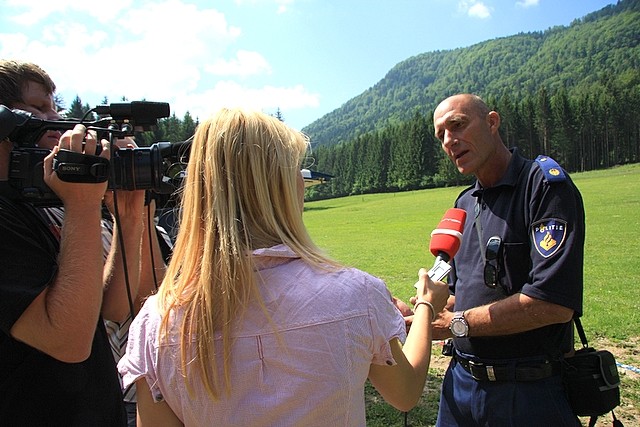The 9th annual trials for dog handlers and police service dogs (for general and specialist use) were held between 30 May and 1 June 2011 in Gotenica. This year's trials welcomed a record number of competitors participating in four events.
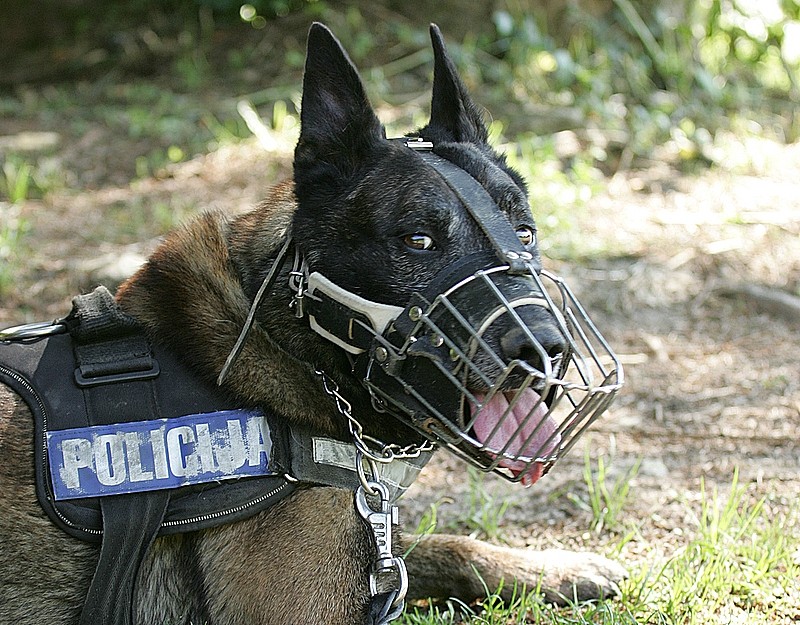
Organised by the Police Academy's Service Dogs Training Section, the trials were attended by as many as 70 handlers from the police (with 36 dogs for general and 34 dogs for specialist use), seven military handlers (with two dogs for general and five for specialist use), eight handlers from the customs administration (with dogs for specialist use only), three handlers from the prison administration (with one dog for general use and two for specialist use), and one handler from Croatia's Ministry of the Interior.
Jože Metelko and Jazz searched the vehicle and quickly located the explosives
The handlers of dogs for general use put their stamina and skills to the test in four events: tracking, obedience, a field test (a 3 km track with 12 obstacles, involving shooting and defence without a muzzle), and a woodland search, which is the fourth event and is selected each year in a draw comprising a building search, a woodland search or free tracking. The handlers learn about the fourth event only moments before its commencement.
In the team competition, the best performing handlers of police dogs for general use were the teams from Celje Police Directorate which secured first and third places, with the Ljubljana PD team taking second place. This year's national champion in the individual competition was Peter Urek of Krško PD, followed by Jože Močnik of Celje PD, and Matjaž Novak of Ljubljana PD taking third place.
Results
The results for the specialty categories are as follows: Ivan Šabec of Koper PD took gold in drug detection. The runner-up was his colleague, Renato Pušnik, and third place was awarded to Bogomir Velikonja of Nova Gorica PD. The best explosive detection was performed by last year's winner, Jože Schonveter of Murska Sobota PD. The second and third places were taken by Jože Metelko of Ljubljana PD and Robert Rogelj of Kranj PD respectively.
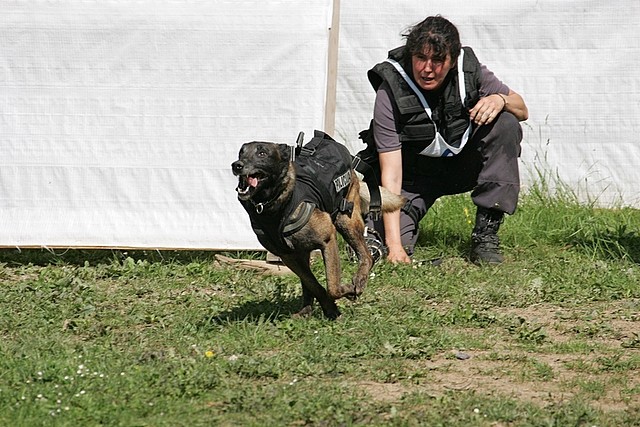
Marko Medvešek, the Head of the Service Dogs Training Section, claims that the handlers and their four-legged companions are continuously demonstrating improvement in their professionalism and skills. The annual trials are a wonderful opportunity for them to put their skills to the test. "At the outset of these trials, the differences between the competing handlers were vast. There were just a few dog-handler pairs that excelled, which is why the results were almost always predictable. Today, the handlers and their dogs demonstrate almost equal levels of competence, rendering the competition more balanced. The differences between the handlers are minimal and the winners are not known until the competition has concluded," emphasised Marko Medvešek.
Marko Medvešek, the Head of the Service Dogs Training Section
"Annual testing such as this is a wonderful chance for us to network with foreign law enforcement organisations, promote our own organisation and training methods, and enhance cooperation. Cooperation appears to be the most important aspect as we are all engaged in pursuing the same objective," added Marko Medvešček, who is managing the trials.
Montenegrin police representative, Zoran Prelović
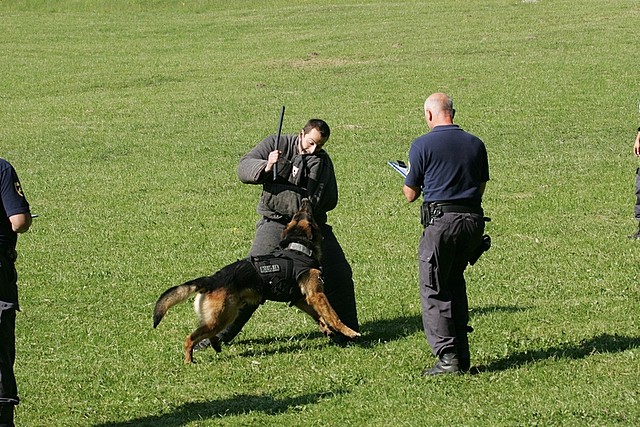
This year's trials were attended by representatives from the Montenegrin, Kosovar and Dutch police. They were all overwhelmed by the standards demonstrated by the Slovenian canine teams. Zoran Prelović, an instructor from Montenegro attending for the first time together with his colleagues, said, "There is a lot to learn from the Slovenian instructors and police dog handlers. This year, we are in the role of observers, but next year we will certainly send three handlers and dogs to compete in drug and explosive detection and the general category."
"This is an interesting experience: the event has been organised perfectly and the level of hospitality has been overwhelming," added Prelovič, hugely impressed by the standards demonstrated by the Slovenian handlers and the training centre facilities in Gotenica. He confirmed that further police dog training sessions with Slovenian instructors are in the pipeline. "Our aim is to have three or four Montenegrin police officers trained by the Slovenian Service Dogs Training Section in order to improve their skills. These trials have demonstrated that your handlers have the quality we are looking for."
Sanja Herceg
Sanja Herceg, an employee at Croatia's dog training service, said about the Slovenian police. "We cooperate intensively, and we have already worked together in a Frontex-led project. The training methods utilised by Croatia and Slovenia are quite similar, which comes as little surprise given that our instructors and handlers have been trained in your country."
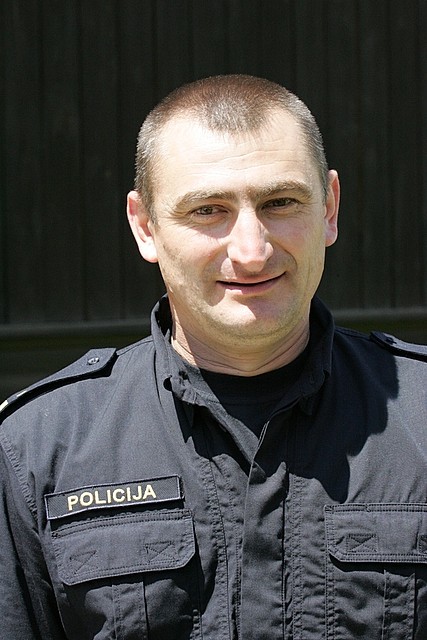
Stjepan Pilat, the handler of a dog trained in explosive detection, participated in the trials for Croatia outside the auspices of the official competition. Like many of his colleagues, he too was trained in Slovenia and has been involved in dog handling since 1994. "I found the trials interesting and I did my best, but there is certainly still room for improvement."
The Croatian police appreciate the work carried out by the Slovenian dog handlers and instructors. "I was already impressed when I trained with the Service Dogs Training Section; the Slovenian handlers and instructors take their work seriously and we are glad to be able to share our experiences. Our cooperation is just great and I hope it will remain so in the future," added Pilat. 
A Kosovar police dog handler and head of the canine unit, Bekim Ademi, has seven years of dog handling experience. This is his second visit to Slovenia. "I've noticed the differences between the ways the dogs are trained in our respective countries, especially with regard to obedience, attack and tracking."
"We don't muzzle service dogs in the Netherlands," commented Berend Jan Rietberg
Berend Jan Rietberg, a Dutch dog handler, is rather surprised at the use of muzzles, which is in fact one of the peculiarities of Slovenian police dog training practice. Dutch police dogs are not muzzled. "Your training practices are significantly different. Your regulations define the use of a dog with and without a muzzle. This is irrelevant in the Netherlands - once I unleash the dog and let it out of the car, the dog is free to bite," he explained. Also, there is no police dog training authority in the Netherlands; dogs are purchased from private breeders and trainers.
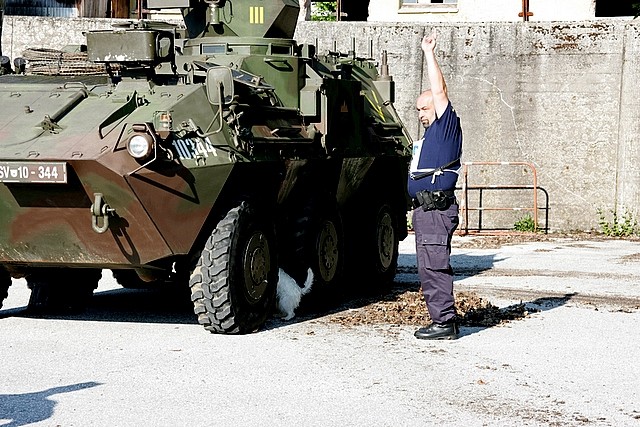
"Object retrieved!"
One feature that particularly distinguishes the Slovenian police from other fellow organisations in Europe is the selection of breeds for specialist use. Hunting dogs are used in addition to Belgian and German Shepherds. "About 10 years ago we realised that certain hunting breeds demonstrate some excellent abilities; they are more enthusiastically engaged in locating the object and are more persistent, and these are precisely the qualities that the police are looking for," said Medvešček. Belgian and German Shepherds and Rottweilers, however, are commonly used for general purposes.
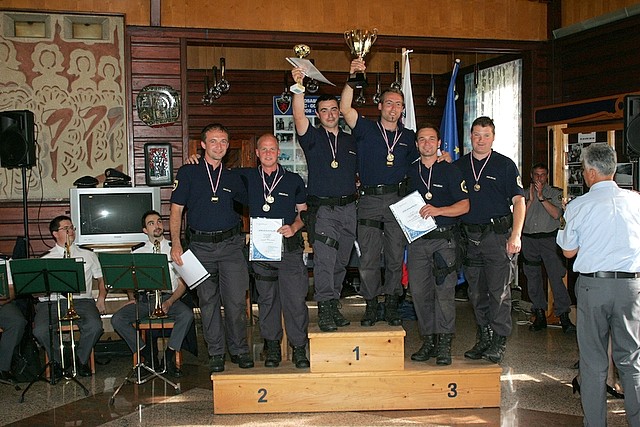
After the trials the results were announced and the winners were presented with medals. The Director of the Police Academy, Anton Vozelj, then addressed the handlers and congratulated the winners on their achievements at the 9th annual trials, acknowledging their effectiveness in executing police duties.
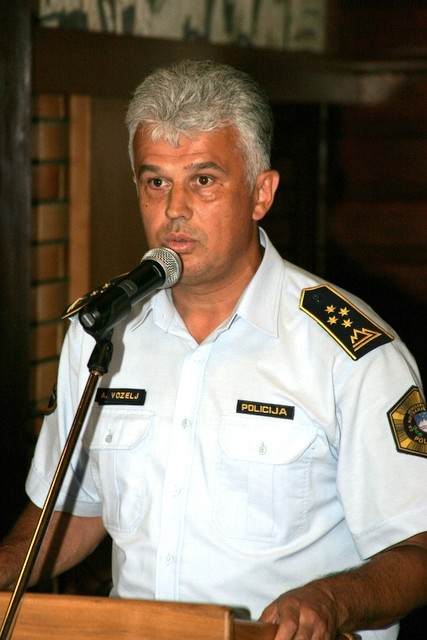
Anton Vozelj, Director of the Police Academy
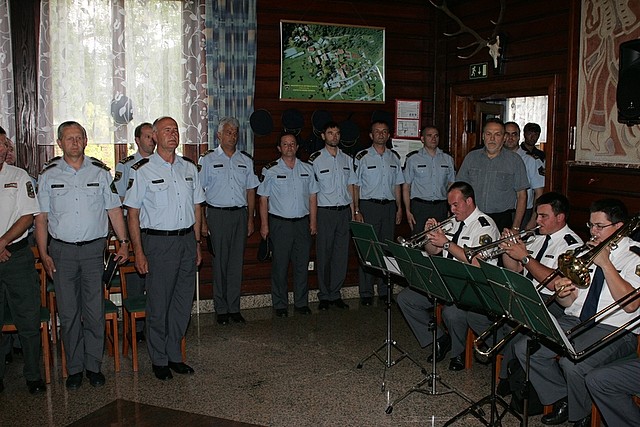
The ceremony, which included a performance by the Police Orchestra quartet, was attended by senior officers from regional PDs, the Police Academy and the GDP's Uniformed Police Directorate who congratulated the handlers on their achievements.
***
Following the model of similar competitions organised by European police organisations, the first national trials for police service handlers were held in 1989 in Tacen. The event has become a tradition and has since been organised by every regional police directorate. However, since 2001, owing to changes made to the internal rules of competition and the complexity of organising such a major event, the national trials have been organised by the Service Dogs Training Section. Since 2002, the national championship has been renamed the Annual Dog Handler Trials.
Photo: Marko Govekar


